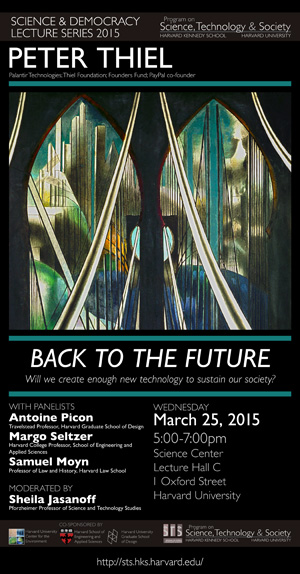Program on Science, Technology and Society at HarvardHarvard Kennedy School of Government | Harvard University |
|||||||
|
|
Back to the Future: Will we create enough new technology to sustain our society?Peter ThielPalantir Technologies; Thiel Foundation; Founders Fund; PayPal co-founder March 25, 2015, 5:00pm-7:00pm AbstractRecent discussions about the role of technology in society have oscillated between very short term worries ("what are smart phones doing to our brains?") and very long term nightmares ("will artificial intelligence replace humanity?"). Left out of these discussions are the next twenty years: our horizon for making concrete plans. The most important question for this medium term might be: will we create enough new technology to sustain our society? Instead of taking it for granted (or doomed), we must go back to the future and build it ourselves. Video of this lecture is located here. PanelAntoine PiconG. Ware Travelstead Professor of the History of Architecture and Technology at the Harvard Graduate School of Design Margo SeltzerHerchel Smith Professor of Computer Science and a Harvard College Professor at the School of Engineering and Applied Sciences Samuel MoynProfessor of Law and History at Harvard Law School Moderated bySheila JasanoffPforzheimer Professor of Science and Technology Studies About the speakerPeter Thiel is an entrepreneur and investor. He started PayPal in 1998, led it as CEO, and took it public in 2002, defining a new era of fast and secure online commerce. In 2004 he made the first outside investment in Facebook, where he serves as a director. The same year he launched Palantir Technologies, a software company that harnesses computers to empower human analysts in fields like national security and global finance. He has provided early funding for LinkedIn, Yelp, and dozens of successful technology startups, many run by former colleagues who have been dubbed the “PayPal Mafia.” He is a partner at Founders Fund, a Silicon Valley venture capital firm that has funded companies like SpaceX and Airbnb. He started the Thiel Fellowship, which ignited a national debate by encouraging young people to put learning before schooling, and he leads the Thiel Foundation, which works to advance technological progress and long-term thinking about the future. Despite his criticism of the education bubble, in Spring 2012 Peter taught a class in the Computer Science department of his alma mater Stanford University. He has now revised and rewritten that class to make the new book called Zero to One: Notes on Startups, or How to Build the Future. Co-sponsored by the Harvard University Center for the Environment, the Harvard School of Engineering and Applied Sciences, and the Harvard University Graduate School of Design. About the poster image: A cropped, modified version of Joseph Stella’s The Bridge (1922). |
||||||
